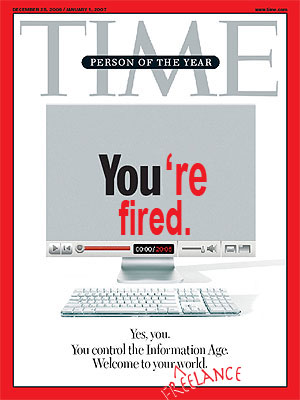"We have equalized our photography rights and rates across our 23+ brands. This is an industry standard. Our new contract is fair and equitable. A huge number of photographers have already signed the new agreement."
Let's break down the statement:
"equalized our photography rights and rates across our 23+ brands"
- so work done for the smallest circulation publication of the 23+ brands gets paid at the rate of the flagship publication. Time no longer thinks that circulation should be a factor in usage, apparently. This does not square with the fact that their advertising rates are absolutely affected by circulation.
- The demand for copyright to your work (in their requirement of a work-made-for-hire clause) on all video content is a massive rights grab that is completely unnecessary, and certainly not a factor in what they are paying.

"This is an industry standard. "
- Simply saying it's a standard does not make it so. Time actually has a leadership role to play here in providing a living pay scale, and this is not it.
"Our new contract is fair and equitable. "
- Again, saying it's fair and equitable does not make it so. The rights demands are unreasonable, and as outlined in the previous article, the actual passage of time shows that equity is definitely not a part of the equation in determining fair rates and terms.
"A huge number of photographers have already signed the new agreement."
- Saying a variation of "everyone else is doing it so you should too" doesn't make it right, reasonable, or fair. In fact, I've heard from more than one photographer who has signed it and when asked further, said "I didn't even read it, I do like one shoot a year for them..." - not smart business, in that case. Growing up in the San Francisco Bay Area, the common refrain when I tried the "everyone else is doing it" excuse with my mother, was always responded to with "well, if everyone else was jumping off the Golden Gate Bridge, would you?"
- Not everyone is going to sign it. We are aware of a number of photographers who have stated they will not.
- When you are a contract photographer and committed 100 days a year under that contract, you have a significant amount of sway over someone because they are essentially beholden to Time Inc for 50% of their income, and with 60 days, not likely to be replaced in that period of time. You can be sure though, that more of them will be disgruntled and otherwise feeling taken advantage of. This will reveal itself in their commitment, no doubt. Many photographers use 100 days of work per year as basis for calculating all their costs, so for many, this represents their entire client base, which is reasonable when you factor in that there is prep time and travel time as well.
- Thus, this is akin to going to an employee and substantially and materially changing the terms of their employment. Except here, Time Inc can (and has) terminated all contracts effective 12/31/15 and is requiring this contract be the new terms under which they will work.
Sign this contract at your own peril. It will not work out well for you in the long run. You will be, effectively, jumping off a bridge without a safety net, and, rest-assured, the next contract they demand you sign will be even worse. History has not shown contracts to get better over time. This TIME is no different.
Please post your comments by clicking the link below. If you've got questions, please pose them in our Photo Business Forum Flickr Group Discussion Threads.

Do we know if Jim Nachtwey has signed this contract as he is one of their top contributors. Is he held to the same standard as other contributors?
ReplyDeleteTime Inc. UK forced contract photographers to sign a new contract in January 2015, but the director of corporate communications told PDN that individual contract photographers could object to and renegotiate specific parts of the contract if they wanted to.
ReplyDelete“[They] will not want to assign and/or waive their rights and there is no obligation for them to do so – if they do not wish to do so, they may object and negotiate different terms with us in the usual way.” - Karen Myers, Time Inc. Director of Corporate Communications
So if this was the case in the UK, I wonder if photographers like James Nachtwey, as you mentioned, will be able to renegotiate the contract on an individual basis. But of course, even if he does, no one else will ever know.
So if we as photographers discuss what to charge, we're guilty of price fixing and collusion maybe even racketeering. If Mega Publishing Inc calls and asks what Giant Publishing Inc pays and then pays the same rate they are ... 'Paying According To Industry Standards'.
ReplyDeleteUh ...
What about Platon or Martin Schoeller? I think Time will have to make some exceptions...
ReplyDelete